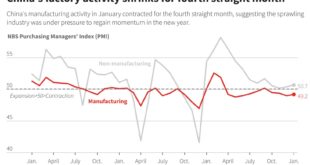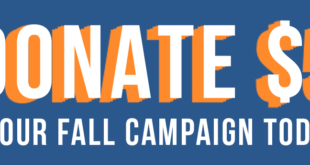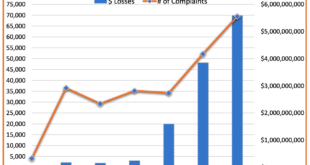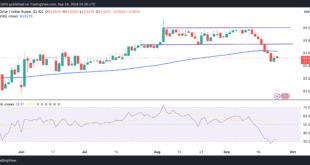China is on the edge of recession — excluding Covid, for the first time since 2008 — as new data showed all-important manufacturing contracted for the fourth month in a row with particular weakness in new orders.In other words, what they’ve got is a backlog, then it’s a cliff.Manufacturing makes up a third of China’s economy — much more than the US. The collapse of China’s property — another third of China’s economy — is adding further fuel to the fire.Offices...
Read More »No, Russia is Not Losing the War in Ukraine: A Reply to Paul Schwennesen
On September 5th, Reason Magazine published a very strange assessment of the war in Ukraine, written by Paul Schwennesen, titled “The War in Ukraine Is Already Over—Russia Just Doesn’t Know it Yet.” In short, Schwennesen argues that, based on his experience recently traveling to the front in Kursk Oblast, Ukrainian will and high morale mean that the war is as good as over and that Ukrainian triumph is “inevitable.”Schwennesen’s analysis that Russia has as good as...
Read More »The Comic Absurdity of a US Sovereign Wealth Fund
In recent weeks, both candidate Donald Trump and President Biden—via his staff—have expressed support for the idea of a US sovereign wealth fund (“SWF”). An SWF is simply an investment fund run by a national government. Ostensibly, the goals of such a venture are twofold—to increase the wealth of America and its citizens, and to spur innovation in “critical” areas like infrastructure, technology, and medicine.An American SWF is bound to fail on at least these two...
Read More »Run on the Dollar Stalls after the Market Boosted Odds of another 50 bp Fed Cut
Overview: Weak US consumer confidence, especially regarding the labor market boosted speculation of another half-point Fed cut in November when the central bank meets again. This weighed on the dollar. Sterling and the Australian dollar rose to new 2 1/2-year highs. The PBOC followed up yesterday's package with a 30 bp cut in the one-year Medium-Term Lending rate. After extending its losses earlier today, the dollar has steadied and turned higher against most of the...
Read More »Agency REITs For A Bull Steepener
In our recent two-part series on the yield curve (Part One Part Two) we discussed the four predominant yield curve shifts and what they imply about economic activity and monetary policy. Additionally, given the current bullish steepening trend of the yield curve, we provided data on how prior bull steepening environments impacted various stock indexes, sectors, and factors. Missing from our analysis was a discussion of a specific type of REIT whose valuations are...
Read More »LUKB bietet neu sichere Ein- und Auslieferung von Kryptowährungen an
Die Luzerner Kantonalbank (LUKB) bietet ab dem 1. Oktober 2024 ihren Kunden die Ein- und Auslieferung für die Kryptowährungen Bitcoin und Ethereum an. Bereits im Juni 2024 hat die LUKB einen Kryptoanlageplan auf den Markt gebracht und ergänzend zu Bitcoin, Ethereum und USD Coin neu auch Investitionen in die Kryptowährungen Chainlink und Polygon ermöglicht. Ab dem 1. Oktober 2024 können Kunden der LUKB ihre Kryptowährungen Bitcoin und Ethereum aus anderen Wallets in...
Read More »FBI Crypto Report: Fraud Surges Driven by Investment Scams
In 2023, cryptocurrency fraud continued to surge globally as rising adoption of digital currencies attracted scammers seeking to exploit the hype and target credulous users. Last year, the Federal Bureau of Investigation’s (FBI) Internet Crime Complaint Center (IC3) received a record of 69,468 crypto-related complaints, a 33.6% increase from 2022’s ~52,000, new data released by the division show. Losses soared by a whopping 45% year-over-year (YoY) to an all-time...
Read More »USD/INR drifts lower on improved risk appetite, softer US Dollar
Indian Rupee gathers strength in Wednesday’s early European session. Improved risk appetite and a weakening USD support the INR. Investors await the US August New Home Sales and Fed’s Kugler speech on Wednesday. The Indian Rupee (INR) edges higher on Wednesday. Improved risk appetite following China’s stimulus measures and the softer US Dollar (USD) boost the local currency on the day. Nonetheless, rising crude oil prices, outflows related...
Read More »Economically-Illiterate Policy Proposals Are Popular, And Economists Are to Blame
According to a recent poll from the Wall Street Journal, many of the policies proposed by Kamala Harris and Donald Trump that economists hate most are very popular with the American public. For example, the plan endorsed by both candidates to eliminate taxes on tips for service workers is favored by nearly 80 percent of the ordinary public. However, only 10 percent of economists support the measure.A similar difference can be found with Harris’s plan to penalize...
Read More »The Fed Cut the Interest Rate to Bail Out the Treasury
The Federal Reserve decided to cut rates by 50 basis points despite what Chairman Powell considers “no risk of a recession or downturn,” a “solid economy,” and a “strong job market.”After ignoring the impact of monetary aggregates and the warning signs of inflation, the Federal Reserve has breached its price stability mandate for three consecutive years, preferring to prioritize liquidity injections, i.e., printing money, to the recovery of the currency’s purchasing...
Read More » Swiss Economicblogs.org
Swiss Economicblogs.org






